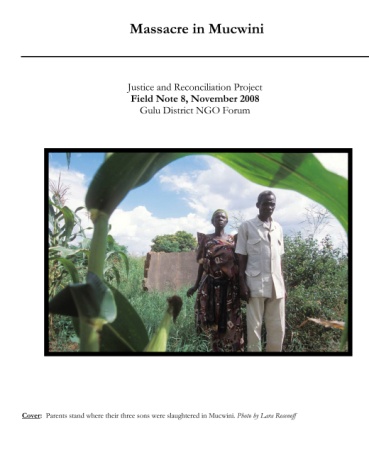
In the early morning hours of 24 July 2002, the villages around Mucwini awoke to the bloodied corpses of 56 men, women and children. The massacre was a deliberate and ruthless retaliation by the Lord’s Resistance Army (LRA) after a local man they had abducted escaped from them with a gun. After they were finished with their ‘work,’ the LRA wrote a letter to the populace, blaming them for the massacre and threatening more killings if the stolen gun was not recovered.
In the aftermath of the massacre, the victims accused the escaped man of purposely orchestrating the massacre to resolve a long standing land dispute between his clan and that of the majority of victims. Since the massacre, both clans have ceased relations and have threatened retaliation if the issue is not resolved using the traditional mechanism of Mato Oput (drinking the bitter root). The victim clan demands the payment Kwor, or death compensation and the elders have busied themselves trying to cool tensions. In the absence of formal justice, the victims attempt to come to terms with what happened using what is available to them: traditional justice mechanisms.
The aftermath of the Mucwini massacre is an important case study of the justice and reconciliation challenges facing peace builders as the Juba Peace Talks conclude. Documenting the events of the massacre and attempts by victims to come to terms with it, this Field Note identifies three important lessons for understanding the impact of violence on community level relations in northern Uganda, and the prospects for transitional justice. First, it illustrates how the local victim population copes with the aftermath of gross atrocity in the absence of accountability. Secondly, it suggests the need to revisit the potential role of traditional justice mechanisms to resolve local conflicts. Finally, it highlights how the war has exacerbated underlying tensions around land ownership.
To access the report, click here.
